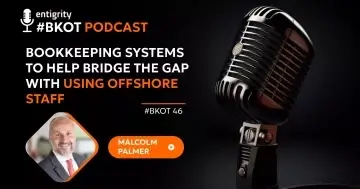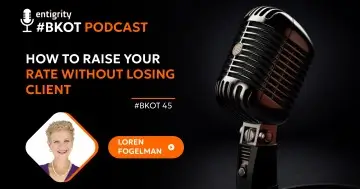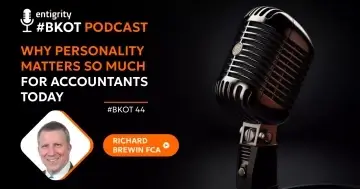Our experts Chris Rivera and Anton Anderson have discussed Proactive and holistic planning using a virtual family office model in this podcast. Watch here to learn more.
#BKOT 40: BUILD A KICKASS OFFSHORE TEAM
PROACTIVE & HOLISTIC PLANNING USING A VIRTUAL FAMILY OFFICE MODEL
Hosted by: Chris Rivera, Director Client relations, Entigrity Offshore Staffing
Guest: Anton Anderson, Managing Partner, Elite Resource Team
Transcript:
Chris: Alright! Hey everybody, what's going on? My name is Chris. It's episode number 40. #BKOT. We're very excited to have a special guest on today, we have Anton Anderson, who is the managing partner at the elite resource team. And very excited to talk about proactive and holistic planning using a virtual family office model. So as always, we're trying to bring insight and new ideas into the accounting community to help you guys out. So thank you for taking time out of your schedule to join in. And so let's get started. So Anton, thank you for coming from the west coast today.
Anton: Yeah. So as you said, you referenced the West Coast, they're born and raised in San Diego, still located here. Let's see graduated in the mid-early 2000s, and was working full-time started at Smith, Barney, and went to Merrill, Merrill Lynch after that, and then a small boutique firm. And so just kind of got bit with the entrepreneurial and finance bug early on. And at some point, after realizing that the larger wirehouses weren't really the right fit for me, I left joined a smaller firm, which is where I originally was introduced to the concept of the virtual family out. Well, at the time as a family office. It was a CPA working with internal family members. And they had a collective net worth in the billions. And so I became really close with this CPA learned a lot about the family office structure. And eventually, it just kind of got to the point where it made a lot of sense, this concept of professionals coming together to offer proactive and holistic advice rather than competing with each other, you know, but the average family isn't the 200 million net worth the 500 million network plus. I came from a long line of educators and elementary school professionals. And so it was a different world. But I realized that same collaborative concept that I saw represented in the family office, could bring just as much value to, you know, my family, or, you know, the neighbors that I grew up down the street from. So that's kind of what started this whole pursuit of taking some of the core fundamental concepts of a family office and applying them to more of I would say, the mass affluent and affluent clientele, that a lot of the advisory and accounting community serve on a more consistent basis across the US.
Chris: And then, about 2013 or 14, you started, elite resource team, right?
Anton: Yup, so 2009 broke out on my own from a boutique firm here in San Diego and was working within this virtual family office type of structure. But as an advisor, built a few really good partnerships with CPAs, here in San Diego. And just eventually, I realized the reference, my parents, been educators a minute ago. So I'll tell you, the blood runs deep, you know, I realized I really loved the education, the training, and so probably more so than actually working with clients. And so that's 2014 kind of started transitioning out of individual practice. And by 2015, was really full time in more of the training, consulting, educating space started elite resource team, and have had have haven't really looked back. And we've grown to work with over 1100 partnerships across North America, basically, helping accountants and financial visors come together to offer more proactive and holistic planning to their mass affluent and affluent clients.
Chris: That's a great story, honestly. And what you bring to the table is a very much-needed resource, especially since the accounting world was just pushed right into this whole virtual model here. And you don't usually correlate holistic and accounting together. And so but it's looking at it rather than just a number cruncher or just a tax preparer, you're looking at it as a whole. So tell me about that this holistic approach and working with the firms that you do, and kind of where do you identify if this is going to work for them or not. So you tell me about some of the processes.
Anton: Yeah, love to man. And I appreciate the feedback on that. So you know, similar to what your company has recognized, and I love what you guys are doing, which is probably why we've hit it off, but we are recognizing that the compliance-based reactive work is being commoditized. Right? I mean, there's no secret there when we started telling that story in 2015. It was a little bit of an uphill. That'll now it's just it's given. So really the not only the accounting space but also the advisory space, I mean, technology, outsourcing, those are compressing the fees. And so now we kind of look at it. And we have to say, Well, where do we really bring value to the marketplace? Is it really just recording taxes or running investments? portfolios? And the answer's no, I mean, really, where we bring value is by solving problems.
I had a mentor one time that said, you want to make a little bit of money, solve little problems, you want to make a lot of money, solve big problems. And so what we're realizing is, the more value we can bring in, the bigger problems we can serve, the stronger business we can grow, and the more revenue we can generate, and doing it in a very win-win-win way, right? It's like, the more collaborative we can be, the more value we can deliver to clients, it's a pretty cool opportunity, I think that we have in front of us. And again, much like what your firm's doing, there's really no limit to how to bring value. It's kind of like the wild wild west of redefining our role in the marketplace. It's like, how do you bring value while you solve client problems? There's a lot of ways to solve problems.
Chris: You're spot on with that, as far as I feel bad. At times, firm owners, partners, directors, it just things can get so convoluted and so complicated, for no reason, and you'd simplify big problems, big solutions, small problems muscle, it's just the idea of making it so intense. Now looking at it with the end result being the solution and just going towards the negative aspect or at the same time, just thinking about what will go wrong? And I don't think that's always the right approach and looking at it to where can you build out a cost-effective work-life balance type of solution for your team, right, you're sometimes you get hyper-focused on the client. But at the same time, you got to realize the team that you have.
And that's what kind of what's going on with these staffing shortages that I'm seeing all across the nation, you gotta love and take care of your team first. And I just feel that that being an accountant anymore is not the way it used to be, no one wants to be an accountant. And so this is really taking firms to take a deep dive into the staff that they have, and how to build an effective solution to have service delivery for the client. And so what, when you talk about this virtual family office model? How do you see that integrating into the everyday accounting firm?
Anton: So you hit the nail on the head, first of all, with your observations? And then and then good question, how does it integrate? So here's, here's the reality. There's way too much complexity for any certainly one individual, but even a small team to become an expert in all things, right? So then we have to kind of ask ourselves, well, then what do we do, like if we are coming to this conclusion that it's better to solve client problems than just being reactive and, you know, do compliance-based work? Like it's better to be proactive, it's better to be holistic, it's better to solve problems and ignore them, then what options do we have.
So we can try to become a jack of all trades, which is just it's not a good solution, you know, there's too much complexity. You can hire. But at some point, you can't hire enough expertise, you can hire a good team and lead them and train them. But there are things that you only come across once a year or twice a year. And it doesn't make sense to try to hire a team large enough to handle situations that clients are only going to come across, you know, once or twice a year. So that then brings us to well, it's 2021.
You know, technology is incredible now. So what I can do now and who I can work with, and the team that I can form is limitless. You know, even just three, four years ago, it was much harder to do this, partly because of the mindset and partly because the technology wasn't there. I mean, we're on zoom right now you're live streaming to Facebook, this is going to be recorded, it's going to be pushed out on probably multiple social media channels. It's like, the technology is there for us to be collaborative immediately. So all we've done is we've won focused on having a conversation in the industry that says, Do we agree that by being proactive and holistic working together, we can bring more value to clients? Yes. Okay.
Boom, first step, if you disagree with that, no problem, but it's just it. This is not the right model and I would argue you're probably going to be left behind, too? How do we do that? How do we actually form relationships with people that can bring us expertise that we trust, that are the best of the best at what they do? So we use technology and we leverage and so we've put a lot of time and energy into building a team. And we call it a virtual family office or team of experts that can handle essentially 95% of the problems that a massive fluent or fluent client is going to have. And typically they fall into one of five areas and says, you know, what, what we talked about day in and day out, but they fall into tax planning, like proactive tax planning, you know, capital gains, estate tax, capital gains tax, whatever it might be, they fall into legal services, succession plans, estates, wills, buy-sell agreements, keyman, etc.
They fall into risk management, you know, insurance, captive insurance, property and casualty, they fall into wealth management, which could be retirement, college plans, investment accounts, etc. And then the fifth would be business advisory services. So like, for those of us who work with small business owners, you know, the business is the baby. So business advisory services mean things like, what's your company culture? Where are you going? You know, what are your KPIs? How are you measuring them? How are you leading your team? How are you keeping your key people, you know, so those are the five areas wealth in just to repeat their tax planning, legal services, wealth management, risk management, or insurance and business advisory services.
So we have a team of dozens of people that are experts in each of those specific areas. So to get to your question, what does it look like from an average accounting firm perspective? Well, you can try to develop that expertise, which realistically, you can't do, you can try to hire it, which isn't feasible from a cost perspective. Or you can plug into a virtual family office that already has all of those areas of expertise. And leverage those relationships, when you are now communicating with your clients proactively, and identify a need or a problem that they have, you can lean into that team. So that's how it looks in terms of the average day-to-day relationship with accounting firms.
Chris: I'm not an accountant, myself, I've been working in different industries, and but it's always been on the sales marketing advisory side. When I came into the accounting community over four years ago, I would ask about referrals. Any industry I've been in as referrals. And I was told, it probably won't work in this just the accounts don't talk amongst each other. They don't share ideas. And I was like, what, why? And since that time, four years ago, wow, when I'm on a call now, one at a time calls could be a reference three, four years ago. Now. It's almost five at a time, it's really good to see that they forming communities alliances, and they're all talking amongst each other and sharing ideas. And you're like, Yeah, I heard your name from a reference group that I'm a part of. And I'm like, it's really enlightening to see this happen. Because it's across, it doesn't. It's not industry-specific, you're going to get references.
If you do, you're going to get best practices, you're going to get good ideas. And I just didn't understand why it wasn't prevalent before. And so you're absolutely right, it all automatically starts with the mindset, if you take stuff going to work, if you have reservations, if you're going to gravitate towards the negative? Well, not for you. But if you're going to have an open mind, look at it in the positive light, see the end and realize that there are steps to get there, then yeah, by all means. And so I've seen that quite a bit, as far as now coming together and sharing best practices, which is awesome.
And the key thing is the, for the accounting for your audience is the Business Advisory side of it. You know, it's not just about plugging numbers anymore. So that provides great value, but then now they're meeting with the CFP’s indifferent and different other aspects. And so you kind of bring all that together. What are your thoughts as far as like references and working together? And obviously, that's what's going on day today. Let's talk a little bit about insight into that.
Anton: Yeah, absolutely. So, I mean, you clearly see there's, there's kind of an old school way of thinking, and I think I oftentimes relate them to, they're in a rowboat, they see the island. They know the boat has holes in it, but they're kind of like I can just get close enough to the island will. I'll make it you know. And that's the old-school way of thinking you're charging hourly or charging by tax return. You're focused on how many W twos you have and the 1120s Whatever, whatever you're, however you're measuring your metrics. And I think then there's a new school way of thinking, which is, I really don't charge based on how many tax returns, I complete how many hours I work, I charge based on how much value I can deliver.
And the more valuable I can create the client experience, not only the more can I charge, the better clients I get to work with, but the more unique my value proposition becomes. And a unique value proposition is something that's very easy to introduce to other clients too. So that's what we constantly see is, you know, first of all, figuring out, how do I bring this client value. And once I've done that, and they go, nobody has ever talked to me about how to do XYZ, then it automatically results in introductions to other clients that are in similar situations, because other people aren't talking to them about solving their problems, either. You know, so, yeah, the organic growth is a huge aspect of I think, what's happening, and you're just you're seeing it, it's like, the best clients will naturally go to where they receive the most value. And so that's, that's part of the whole, I think the goal should be how do you, how do we create a model in which a one-person shop or a five-person shop, you know, a 10 person shop can compete with some of the super regional and national firms that have 50 people? You can do that not by hiring 50 people, but by leveraging firms like yours, leveraging technology, leveraging firms like ours, to really just grow in a smart way?
Chris: Yep. Yeah. And in an account is valuable to small businesses have realized that this entire time that the advisory side should already be implemented, and now they're looking at doing it. And so when a firm is about to shift the model, let's say from an hourly to the service-based value-based type of pricing, and what are some quick tips that you can give to, and how to approach that type of model and the change? Where should they start?
Anton: Yeah, so this is obviously one of the biggest struggles, right is that a lot of accountants have what I call service debt. Your model right now is requiring a tremendous amount of time. And that time has you on a hamster wheel where you're like, I would love to change something. But I'm so busy with what I'm doing right now. And I need to keep doing what I'm doing right now in order to keep the lights on and the employees I have hired. So what they have to do most of them is you don't get changed like that. You have to put in strategic techniques, where you start slowly shifting and realizing that it might take 12 months, 24 months. But yes, my future firm can look very different from what my firm today looks like.
So a couple of the things that we help the accountants with right out the gate is, again, working with a firm like your switches, what's the value? what's an hour of my time worth? And I'm not talking about what do I charge? But I'm saying like, what is my time worth in? Could I pay somebody less to do anything that I'm currently doing? If the answer is yes, that's the first step. Like if I can free up an hour of my time, and in general, I look at the revenue I make, and I make 250 an hour, and I can pay somebody $50 an hour? Well, that's a great arbitrage. So that's part of it. Another thing we talk about often is, is there a portion of your book that you can sell, you know, a lot of times people think selling means selling everything, but not necessarily like you can package up a percent of your clients. And you can sell that specific package, you know, so we work with brokers that specialize in doing that with accountants because then all of a sudden you free up time. And you also have a little bit of revenue that comes in from those relationships.
Another thing we talk about is basically transitioning. So we have we tell a lot of funny stories, but one of them is you build in a strategy where for every new client you get, you let go of or you push on to a junior accountant or you fire or you raise significantly the prices of two DNC or DNF clients, right? So you get a new a to two DNC is kind of out the door. Now you fast forward that 12 months, and all of a sudden you realize you've added six good clients, you've got rid of 12 bad clients. So those are a couple of strategies, right? I mean, you can hire people and create a time arbitrage you can block off or section a book of clients that you can sell. You can set a structure in place where for every good new client, you get rid of two bad clients. And again, over 12, 24, 36 months, you start realizing, wow, I have actually quite a productive firm with a better work-life balance. And I enjoy what I do more.
Chris: Yeah. And I love it. Yeah, no, because then when college graduates or somebody looking for experience at that lower level, and the firm could bet approach, approach them in that aspect of this is advisory, you know, compliance, and you can make accounting fun again, and they get a position like, wow, I want to go to work with this public practice.
Because there's so just so much animosity towards it. And just like, I don't want to do that, I can't do that. And no work for a private firm, or governmental firm. And just something that's fun, right? It's a new age and new way of thinking, and there's technology and everything going on. It's changed the mindset of everyday of today's workers. I mean, I'm coined as a geriatric millennial, because I was born between 80 and 85. So I know what it's like not to have a cell phone, and now everything at my disposal, it's insane. And I get it, and I can relate to that. But and change is constant. You could deny it for 30 years, 40 years, and at some point in time, it's going to happen, and you have to accept it. And so because I hear a lot about we've been doing this certain way, then it's been so many years. And it's like, well, what are we doing here? Now, if it's been working for you, and at that point, you have to have the mindset and then you're right, it's not going to happen tomorrow morning or the next day, there's going to be an endpoint, and you're going to have to get there, there's going to be these steps.
And I like the approach, as far as, you know, looking at your firm, and in on getting the right client. I've worked with clients where they're saying, oh, man, this client or this client, why do you still like working with them? Or, you know, change the price that you said? So no, I totally agree with that, and utilizing the resources you have currently and not for data entry, and make sure that you identify your team's strengths and be able to convert them into more, doing more challenging, and more value-added services. So yeah, no spot on. As we great conversation, as we wind down more any other tips or any other final thoughts that you want to give our audience today.
Anton: You know, just to kind of paint the picture for anyone listening potentially, who hasn't worked in a firm like this or been there before? Typically, what the end goal looks like is clients are on some type of monthly retainer, right, it's a minimum probably of $250 a month, that's maybe up to like two grand a month, the more value obviously we're bringing, the more we charge, and the more they're really happy to pay. So you're spreading out your annual revenue, you're reducing your kind of tax season, you know, major hours, because overall, you have actually fewer clients.
But in general, you're charging them more, because you're delivering more value. And like you said, You have I think a more enjoyable overall company culture as well as a kind of dynamic yourself. I mean, the ideal scenario is somebody who says, I really don't care if I complete another tax return in my career or not like if I didn't have to create another tax return, I would be just as happy as you know if I had to do, do one or not. So the ideal scenario is somebody doesn't love doing tax returns, but they love bringing clients value, there's a lot of ways to bring clients value. And I think that's what we're just kind of looking at it like I said earlier is a little bit of wild west and redefining the relationship to the marketplace, and how we bring value. And I think the more proactive and holistic we can be in doing that, the more value we can bring, and the more we create a win-win-win. So nice fun, I think it's an exciting time, and we're gonna see a lot of, you know, a lot of things change in the next three to five years. It's a pretty big window of opportunity.
Chris: Absolutely! this is why, you know, we bring Alexs like you to talk to the audience and make them realize as you can do is you can, you could have done this before, but now is the best time ever to go ahead and get started. And there are resources out there. That's the key thing. And it's not just technology. Yes, technology's there. But you have to realize that there are people to help you. You may not be strong in the business side of it. Plenty of people out there to help you. You're good at what you do. Great. So I really appreciate you coming on today and speaking to our audience and for now, take care. We'll talk soon and everybody did time out of their schedule. Thanks for joining in. And yeah, have a good rest of your day.
Anton: Thanks, Chris. Thanks for having me.
Entigrity™ is a trusted offshore staffing partner to over 550+ accountants, CPAs, and tax firms across the US and Canada. Our flexible and transparent hiring model helps firms of all sizes hire staff for accounting, bookkeeping, tax preparation, or any other task for 75% less cost. As a firm 'run by accountants, for the accountants', Entigrity captures the hiring needs of accounting firms most precisely, providing staff that works directly under your control and management, still, you are left with least to worry about compliance, payroll taxes, overheads or any other benefits.

_1642676318-1686039629.webp)



